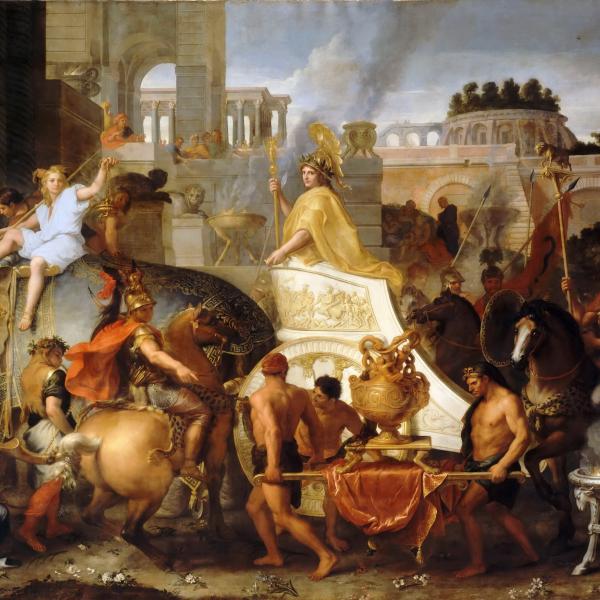By Noah Cohan
Lecturer, American Culture Studies and English
PhD, 2015, Washington University
“In remembering Jackie Robinson,” writes Gerald Early in A Level Playing Field: African American Athletes and the Republic of Sports (2011), “what we have is a poignant rendering of a glorious fanfare of uncertain trumpets.” Robinson was the first African American to play in baseball’s major leagues since Moses Fleetwood Walker in 1884, and is commonly thought to have been the first ever. Yet America’s collective desire to celebrate Robinson’s accomplishment, Early convincingly argues, has only served to flatten our understanding of a complicated man into an easily digestible symbol of racial harmony.
There is perhaps no better evidence of this oversimplification of Robinson’s life and legacy than the 2013 Hollywood biopic, 42, which settles for certain trumpets and a truncated version of the Brooklyn Dodgers’ star’s career, concluding after his rookie season of 1947. It ignores the larger story of a conflicted man whose famous promise to turn the other cheek when faced with racism lasted only the first two years of his career; a man who testified against African-American popular icon Paul Robeson in front of the House Un-American Activities Committee in 1949; a man who died (at the age of 53) acutely aware that true integration in baseball meant black management as well as black labor, something yet to be achieved in meaningful numbers to this day. Instead, the film concludes with Robinson circling the bases in slow motion after hitting a home run, the crowd on its feet.

A modest success at the box office, 42’s tale of sports as spur-to-progress now has a similarly soothing (and succinctly titled) successor: Race. Chronicling the glorious fanfare that surrounded African-American sprinter Jesse Owens’ four gold medals at the 1936 Olympic Games, held in Nazified Berlin and filmed by the Reich’s in-house auteur, Leni Riefenstahl, Race, like 42, means for its audience members to leave the theater feeling good about themselves and America. Our nation’s position on the non-abhorrent side of World War II helps with that, of course, as does the fact that Owens, like Joe Louis and Robinson, largely embraced his role as patriotic propaganda. When our national anthem plays over the loudspeaker in the Olympic Stadium, Race’s Owens (played by Canadian actor Stephan James), like the historical Owens, salutes the American flag: his fingers pressed to his forehead in a stadium full of stiff-armed hails.
What’s more, as they are for Robinson in 42, Owens’ achievements in Race are couched in interracial assistance, as the benevolent white man — in this case Jason Sudeikis’ Larry Snyder rather than Harrison Ford’s Branch Rickey — gives the young black athlete the chance to shine. These patriarchal figures, real as they were, are nevertheless exaggerated because they are the key to these sorts of films — a box office tool to assure white audiences that righteousness did exist on their side of the color line. To Race and Sudeikis’ credit, there is greater recognition of the white benefactor’s self-interest and less growling moralism than Ford emits in 42. Still, Snyder’s kindness to, and influence over, Owens is emphasized time and again; “you belong to me,” the coach says when the two begin training, and for much of the film it feels as if Owens’ story does, too.

Most significantly, Race also concludes at this moment of early triumph, ignoring the complicated legacy that Owens left after the 1936 games. Like Robinson, Owens was a Republican at a time when Franklin Delano Roosevelt’s social programs, and his Democratic party, were increasingly popular with African Americans. Owens’ post-athletics career was peripatetic, as the restrictive dictates of amateurism made it difficult for him to capitalize on his fame in formal races. Instead, Owens took to putting on stunt races — even famously racing against a horse — and giving motivational speeches. Ultimately Owens became a kind of athletic ambassador for amateurism and American exceptionalism. He did so as a friend of the reviled Avery Brundage, the American businessman and eventual president of the International Olympic Committee whose morally questionable efforts to ensure that American athletes participated in the 1936 Nazi games are squeamishly portrayed in Race by Jeremy Irons. At the summer Olympics in 1968, when African-American track stars Tommie Smith and John Carlos famously raised their black-gloved fists on the medal podium as a gesture of solidarity with black people suffering across the globe, Owens publicly criticized the pair. In doing so, he raised the ire of many in the civil rights movement and was deemed an “Uncle Tom” in service of white power brokers like Brundage. Once a symbol of American antiracism, Owens was rejected by newer generations of black athletes seeking equal rights beyond the scope of American foreign policy interests.
Given the dictates of straightforward, uplifting storytelling that many audiences seem to expect from tales of sports heroism, we probably shouldn’t be surprised that Hollywood treads on the path of least resistance. And in a country forced to confront its ongoing racism by the activism of renewed protest movements and the specter of hateful rhetoric from presidential candidates, it’s no wonder that stories like 42 and Race sell themselves as filmic panaceas. But the truth is that spectator sports bear personal and political complexities in every performance, no matter how cut and dried the pronouncement of “winners” and “losers” might seem. And we need better, more complex narratives to do them justice.
In this regard there is some hope rendered before the credits of Race. For despite its limited portrait of Owens, the film does not end in a glorious slow-motion trot. Instead, the film’s final scene paints a portrait of American racism, as the victorious Owens and his wife, Ruth, are forced to use the service entrance to gain entry to a New York hotel holding a dinner in the Olympic champion’s honor. For its many flaws, the film deserves credit for at least foreshadowing the continuing hardships that Owens would face as a black man in America, despite his medals.




